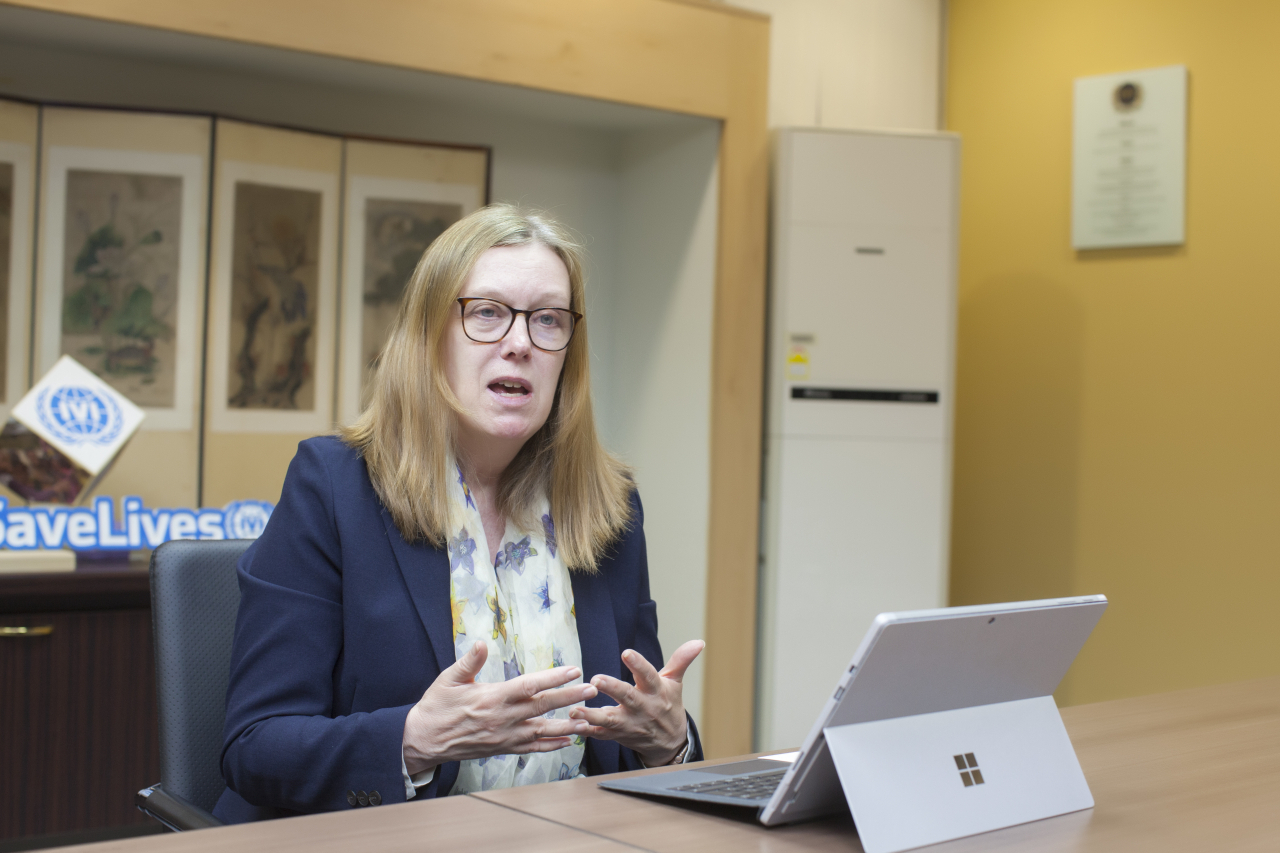[Herald Interview] Global teamwork key for future pandemic response: AstraZeneca co-developer
By Shim Woo-hyunPublished : May 1, 2023 - 17:59

Collective efforts from a global network of vaccine developers and manufacturers will be needed to better respond to future outbreaks and pandemics, said a co-developer of a COVID-19 vaccine that has saved millions of lives.
Sarah Gilbert, professor of vaccinology at the University of Oxford and co-developer of the Oxford-AstraZeneca COVID-19 vaccine, warned that more pandemics will occur in the future.
“There needs to be a global collaboration and recognition that we need vaccines for public health in normal times, but then we really urgently need vaccines in pandemic times,” she said during an interview with The Korea Herald in Seoul on April 25 on the sidelines of the annual Park MahnHoon Award ceremony, sponsored by SK Bioscience and hosted by the International Vaccine Institute.
"There have been pandemics regularly throughout history as far back as we can see, most of them caused by influenza viruses. And so we think that's always the most likely cause of the next new pandemic, but it doesn't have to be. It could be a different virus," Gilbert said. A respiratory virus is also one of the main candidates for the next pandemic, as these types of viruses spread quickly between people, she added.
According to the professor, the main achievement during the COVID-19 pandemic was the great shortening of vaccine development timelines without missing out on any of the necessary steps. In the Oxford-AstraZeneca vaccine's case, this was made possible through combined efforts from her team members.
"We grew to a couple of 100 researchers in Oxford during 2020, and those are people who don't normally work together on the same project,” Gilbert said. “But we needed a lot of people to do the clinical trials -- in particular, to do the manufacturing.” Bringing their expertise to bear on the same problem allowed them to shorten vaccine development to 10 months, which in the past took five to 10 years, she added.
Adequate funding is also an essential part of vaccine development for large-sized outbreaks in the future. "The main thing that we did was not to have gaps between one stage and the next. Typically in the past, we would conduct a phase one clinical trial, stop, assess the data, apply for some more funding and then a year or two years later go into phase two trials.” She added, however, that if the money is there to support continued clinical development, developers can move quickly into phase two and three.
Contract manufacturing companies, like SK Bioscience, will continue to play an important role in a global response to the future pandemics.
"If (the vaccine) can be manufactured and supplied around the world, then we will get the vaccine to people very quickly,” Gilbert said. “What we don't want to happen is for individual countries to develop their own vaccines and only manufacture for their own population. Vaccines need to be shared around the world.”
On Korean vaccine developers who tried to develop their own COVID-19 vaccines, the professor suggested looking back at what they learned from their own vaccine development in the pandemic.
“What we're going to need in the future is really versatile, adaptable vaccine platforms, which will allow us to pick up proper vaccines more quickly,” she said.
After developing the Oxford-AstraZeneca vaccine, Gilbert is returning to projects she was working on before the pandemic. Among them are vaccines against three diseases that have caused outbreaks in the past: Middle East Respiratory Syndrome, Nipah virus and Lassa fever virus.
Meanwhile, upon receiving the Park MahnHoon Award, Gilbert said it was a great honor to be recognized.
“A vaccinology award is obviously something that's very important to myself and my co-awardee, Andrew Pollard,” she said.







![[Graphic News] More Koreans say they plan long-distance trips this year](http://res.heraldm.com/phpwas/restmb_idxmake.php?idx=644&simg=/content/image/2024/04/17/20240417050828_0.gif&u=)
![[KH Explains] Hyundai's full hybrid edge to pay off amid slow transition to pure EVs](http://res.heraldm.com/phpwas/restmb_idxmake.php?idx=644&simg=/content/image/2024/04/18/20240418050645_0.jpg&u=20240419100350)








![[KH Explains] Hyundai's full hybrid edge to pay off amid slow transition to pure EVs](http://res.heraldm.com/phpwas/restmb_idxmake.php?idx=652&simg=/content/image/2024/04/18/20240418050645_0.jpg&u=20240419100350)

![[Today’s K-pop] Illit drops debut single remix](http://res.heraldm.com/phpwas/restmb_idxmake.php?idx=642&simg=/content/image/2024/04/19/20240419050612_0.jpg&u=)